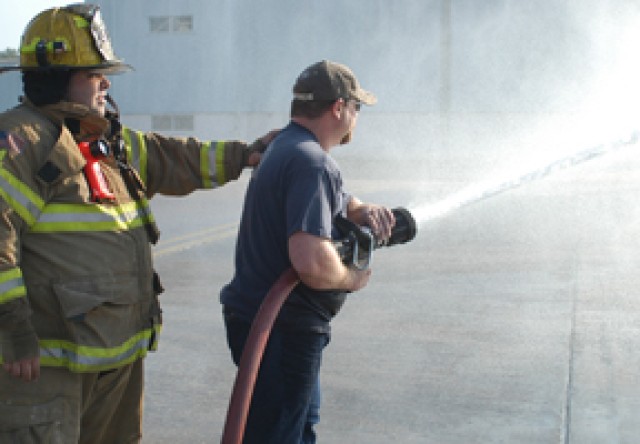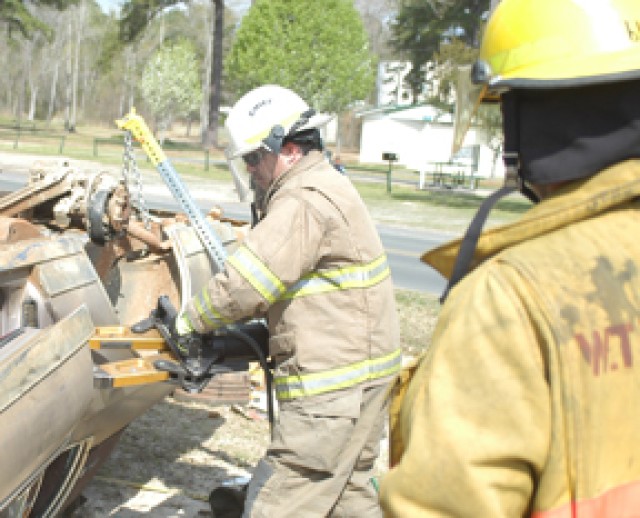FORT POLK, La. -- Fort Polk and the New Llano, La., Fire Department were the scenes of intense fire and rescue training March 19-20. For the fifth consecutive year, instructors from the Louisiana State University Fire and Emergency Training Institute came to Fort Polk to train Directorate of Emergency Services and local firefighters on current techniques and procedures.
Firefighters from Beauregard, Allen, Vernon, Rapides and Sabine parishes converged on the Fort Polk airfield to learn new skills and strengthen their professional network.
"Everyone looks forward to this event each year," said Chief Michael Kuk, Fort Polk Fire Department. "It's fun, but it's also educational. The beauty of this event is that it's not just for the Fort Polk firefighters - it helps our mutual aid partners, too. It gives us a chance to interact in a structured environment, network and share ideas."
The LSU Fire and Emergency Training Institute offers fire, rescue and emergency response training at the school's main campus in Baton Rouge, but it also fields training teams throughout Louisiana.
"It's hard for everyone, particularly the volunteers, to go train in Baton Rouge," Kuk said. "Having their cadre of instructors come here is a great benefit for us. The training institute is quite large - they cover firefighting, rescue, emergency medical services, hazardous material response and industrial firefighting. The instructors are full-time cadre and also volunteer fire chiefs in their home communities." The courses offered by the institute are based on national standards for firefighting, and each student at the Fort Polk class received a 12-hour LSU certificate upon completion.
One major component of the event this year was training to extricate passengers from wrecked vehicles. Extrication training took place at the New Llano Fire Department. The Leesville and New Llano fire departments will field rescue teams with extrication equipment in May. Until now, the Fort Polk Fire Department had the only "jaws of life" tools in the parish. Fort Polk is equipped to respond to even the heaviest of emergency extractions, and local fire departments will now be able to respond to medium emergencies.
"Fort Polk has a heavy rescue squad," Kuk said. "We can take care of anything - we have to. Military vehicles have battle armor and we must have the heaviest and most powerful tools." Kuk looks forward to the additional assets in the parish. "Things are going well," he said. "We have partners in the community that will save Fort Polk firefighters from having to go on a lot of the long runs. Also, if Fort Polk ever has a serious incident and I need more resources, they're readily available. Based on an evaluation of Fort Polk's call responses over the last three years, the parish rescue teams will be able to handle 75 percent of the calls with their new equipment. Fort Polk will always be there as a mutual aid backup, though."
Firefighting apparati evolve with the complexities of modern life, and training also has to adapt.
"One thing we're teaching the firefighters is new vehicle design regarding airbag systems and hybrid technology," said David Coco, LSU instructor. Certain airbag designs pose dangers to the emergency workers in an extraction, and hybrid cars can switch to battery power automatically when the gasoline motor stops after a car wreck. "The students have done well in class," Coco said.
"Not every wreck is the same, and the students are learning different techniques and how to use all of their tools," said Jim Wells, LSU regional coordinator. "This job is all about preparation - they have to be prepared. I have told them they may go their whole career without saving someone from a fire but they probably won't work a year without saving someone from a car wreck."
Technology isn't everything - just like military units fighting a common enemy, firefighters from different departments must work together. The training helped local departments build relationships. "It's important for fire departments to work well together and I've noticed that this group of firefighters does that," Coco said.
"The firefighters aren't just learning from the LSU instructors," said Greg Self, assistant chief, Fort Polk Fire Department. "They're learning from each other. When we need help (on an emergency scene) it seems to work out better because of relationships we've built in these classes."






Social Sharing